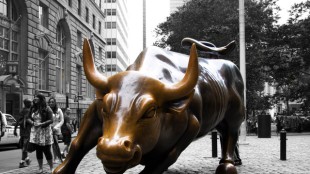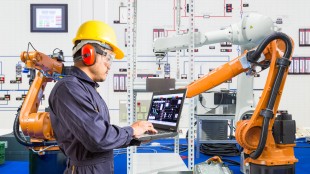-
 South Korea outclass Iran in Asian Women's Cup opener
South Korea outclass Iran in Asian Women's Cup opener
-
Liverpool's Slot says his 'football heart' does not like set-piece trend

-
 Israel aims fresh attack at Tehran: latest developments in US-Iran war
Israel aims fresh attack at Tehran: latest developments in US-Iran war
-
Energy prices soar, stock markets slide on Iran war fallout

-
 'No indication' Iran nuclear installations hit: IAEA
'No indication' Iran nuclear installations hit: IAEA
-
Showdown looms between Tesla and German union

-
 Israel vows intensified attacks: latest developments in US-Iran war
Israel vows intensified attacks: latest developments in US-Iran war
-
France arrests activists blocking ship over alleged Russia uranium links

-
 Tech sovereignty and AI networks set to dominate mobile meet
Tech sovereignty and AI networks set to dominate mobile meet
-
Indian police clash with pro-Khamenei protesters in Kashmir

-
 Israel targets Hezbollah, Iran: latest developments in US-Iran war
Israel targets Hezbollah, Iran: latest developments in US-Iran war
-
Canada and India strike agreements on rare earth, uranium

-
 A rough guide to F1 rule changes for 2026
A rough guide to F1 rule changes for 2026
-
At least 25 killed at Pakistan's pro-Iran weekend protests

-
 Israel kills 31 in Lebanon, vows to expand strikes after Hezbollah fire
Israel kills 31 in Lebanon, vows to expand strikes after Hezbollah fire
-
Myanmar grants amnesty to over 7,000 convicted of 'terrorist group' support

-
 Riyadh's King Fahd stadium to host 2027 Asian Cup final
Riyadh's King Fahd stadium to host 2027 Asian Cup final
-
'Superman Sanju' toast of India after T20 World Cup heroics

-
 Travel chaos, but F1 season-opener in Australia 'ready to go'
Travel chaos, but F1 season-opener in Australia 'ready to go'
-
Lunar New Year heartache for Chinese team at Women's Asian Cup

-
 El Nino may return in 2026 and make planet even hotter
El Nino may return in 2026 and make planet even hotter
-
Somaliland's Israel deal could put Berbera port at risk

-
 Texas primaries launch midterm battle with Trump agenda at stake
Texas primaries launch midterm battle with Trump agenda at stake
-
How a Syrian refugee chef met Britain's King Charles

-
 Bangladesh tackle gender barriers to reach Women's Asian Cup
Bangladesh tackle gender barriers to reach Women's Asian Cup
-
Argentina's Milei says wants US 'strategic alliance' to be state policy

-
 'Sinners' wins top prize at Screen Actors Guild awards
'Sinners' wins top prize at Screen Actors Guild awards
-
New rules, same old suspects as F1 revs up for 2026 season

-
 World Cup tickets: Huge demand and sky-high prices
World Cup tickets: Huge demand and sky-high prices
-
List of key Actor Award winners

-
 Trump hunkers down after Iran strikes
Trump hunkers down after Iran strikes
-
China's leaders gather for key strategy session as challenges grow

-
 UK toughens asylum rules to discourage migration
UK toughens asylum rules to discourage migration
-
Israel hits Lebanon after Hezbollah fire, expanding Iran war

-
 CBS in turmoil as US media feels pressure under Trump
CBS in turmoil as US media feels pressure under Trump
-
Messi bags double as Miami battle back to down Orlando

-
 Greenland is 'open for business' -- kind of, says business leader
Greenland is 'open for business' -- kind of, says business leader
-
Canada's Carney to mend rift, boost trade as he meets India's Modi

-
 Crude soars, stocks drop after US strikes on Iran
Crude soars, stocks drop after US strikes on Iran
-
Iran war spreads across region as US, Israel suffer losses

-
 Miriam Margolyes tackles aging in Oscar-nominated short
Miriam Margolyes tackles aging in Oscar-nominated short
-
Recognition, not competition, for Oscar-nominated foreign filmmakers

-
 Israel, Hezbollah trade fire: latest developments in Iran war
Israel, Hezbollah trade fire: latest developments in Iran war
-
Israel strikes Tehran: latest developments in Iran war

-
 Trump vows to avenge first US deaths as Iran war intensifies
Trump vows to avenge first US deaths as Iran war intensifies
-
Habi Acquires Pulppo to Expand Leadership in Latin America's Residential Real Estate Market

-
 Who Is the Best Plastic Surgeon in Bellevue?
Who Is the Best Plastic Surgeon in Bellevue?
-
vMOX Merges with Advantage Communications Group

-
 Who Does the Cheapest Breast Augmentation in Florida?
Who Does the Cheapest Breast Augmentation in Florida?
-
MWC 2026: Amdocs Unveils CES26, an Agent-driven BSS-OSS-Network Suite, powered by the Amdocs aOS Cognitive Core

Taiwan: Is the "Silicon Shield" collapsing?
Taiwan, long regarded as a linchpin in the global technology supply chain, faces an uncertain future as its vaunted “silicon shield”—the notion that its dominance in semiconductor production deters aggression—comes under strain. The island’s strategic importance, driven by the Taiwan Semiconductor Manufacturing Company (TSMC), which produces over 90% of the world’s most advanced microchips, has historically offered a degree of protection against threats, notably from China. However, recent policies from United States President Donald Trump are raising fears that this shield may be crumbling, leaving Taiwan vulnerable at a time of escalating geopolitical tension.
The Silicon Shield: A Fragile Bastion
The concept of the silicon shield posits that Taiwan’s indispensable role in supplying cutting-edge semiconductors to the world—powering everything from smartphones to artificial intelligence—acts as a deterrent against military action, particularly from Beijing, which claims the island as part of its territory. The theory rests on the catastrophic economic fallout that would follow any disruption to TSMC’s operations, a scenario that would cripple global supply chains and affect major economies, including the U.S. and China itself. For years, this economic leverage has been Taiwan’s unspoken safeguard, complementing its military defences and U.S. support under the Taiwan Relations Act.
Yet, this shield is not impervious. China’s growing military assertiveness—demonstrated by large-scale drills encircling Taiwan in October 2024—and its advancements in domestic chip production have already cast doubt on the shield’s durability. Now, Trump’s aggressive economic strategy is adding a new layer of jeopardy, threatening to erode Taiwan’s technological edge and, with it, the island’s strategic security.
Trump’s Tariff Threat:
Since reclaiming the presidency, Trump has doubled down on his “America First” agenda, targeting Taiwan’s semiconductor industry with a bold and controversial plan. In a speech to Republicans on 27 January 2025, he proposed tariffs of up to 100% on imported microchips, arguing that Taiwan had “stolen” America’s chip industry and that such measures would force production back to U.S. soil. “They won’t want to pay a 25%, 50%, or even 100% tax,” Trump declared, framing the policy as a means to revitalise American manufacturing.
This stance marks a sharp departure from his first term, during which he bolstered Taiwan through arms sales and diplomatic engagement, including a historic call with then-President Tsai Ing-wen in 2016. Now, his rhetoric portrays Taiwan less as an ally and more as an economic rival. His administration has also questioned the $6.6 billion in grants awarded to TSMC under the 2022 CHIPS and Science Act for a factory in Arizona, with Trump dismissing it as a “ridiculous programme.” Such moves signal a transactional approach, echoing his earlier demands that Taiwan “pay” for U.S. defence support.
Economic and Strategic Fallout:
The implications of Trump’s plan are profound. For Taiwan, tariffs would not only raise costs for U.S. importers—likely passed on to consumers—but also jeopardise TSMC’s investments in American facilities, which now total $65 billion. Taiwanese Premier Cho Jung-tai has vowed to maintain the island’s tech leadership, announcing on 28 January 2025 that the government would explore “cooperative plans and assistance programmes” to shield its industry. Economy Minister Kuo Jyh-huei, meanwhile, downplayed the immediate impact, citing Taiwan’s technological superiority, though analysts warn that prolonged pressure could force TSMC to shift more production overseas, diluting Taiwan’s economic leverage.
Strategically, this shift could weaken the silicon shield’s second layer: the reliance of third parties, particularly the U.S., on Taiwanese chips. If Trump succeeds in relocating significant semiconductor production, Taiwan’s role as a global chokepoint diminishes, potentially reducing the incentive for Washington to defend the island. This fear is compounded by Trump’s ambiguous stance on Taiwan’s defence, having dodged questions in 2024 about whether he would intervene if China attacked, instead noting the island’s distance—9,500 miles from the U.S. versus 68 miles from China.
China’s Opportunistic Gaze:
Beijing, which has never renounced the use of force to achieve unification, may see an opening. While China relies heavily on TSMC—despite progress with firms like SMIC—some analysts argue that Taiwan’s chip prowess is less a shield and more a prize, incentivising control over the industry. Trump’s policies could accelerate this calculus. Posts on X suggest a growing sentiment that his approach might “incentivise Taiwan to capitulate” by undermining its economic defences, though such views remain speculative.
Taiwanese officials remain defiant. The foreign ministry, responding to Trump’s tariff threats, reiterated on 28 January 2025 that the Republic of China is a “sovereign and independent country,” dismissing any distortion of its status. President Lai Ching-te, who has stressed the “solid as a rock” U.S.-Taiwan partnership, faces the challenge of bolstering defences—currently budgeted at 2.45% of GDP—while navigating this economic onslaught.
A Shield at Risk:
Taiwan’s silicon shield has never been a guarantee, but Trump’s plan introduces unprecedented pressure. By targeting the island’s economic lifeline, he risks not only disrupting global tech supply chains but also weakening a key deterrent against Chinese aggression. For Taipei, the task is clear yet daunting: reinforce its technological edge, deepen international ties, and prepare for a world where its shield may no longer hold. As the U.S. pivots inward, Taiwan stands at a crossroads, its fate hanging in the balance between economic might and geopolitical reality.

Cuba's golden Goose dies

Mexico after El Mencho falls

Nicaragua on the brink?

Cuba: The Regime's last Card

Strike fears rise over Iran

U.S. Jobs stall, gdp slows

Japan’s right‑turn triumph

EU India deal gains unveiled

AI sparks Wall Street panic

India defies U.S. tariffs

EU misstep on mercosur Deal



